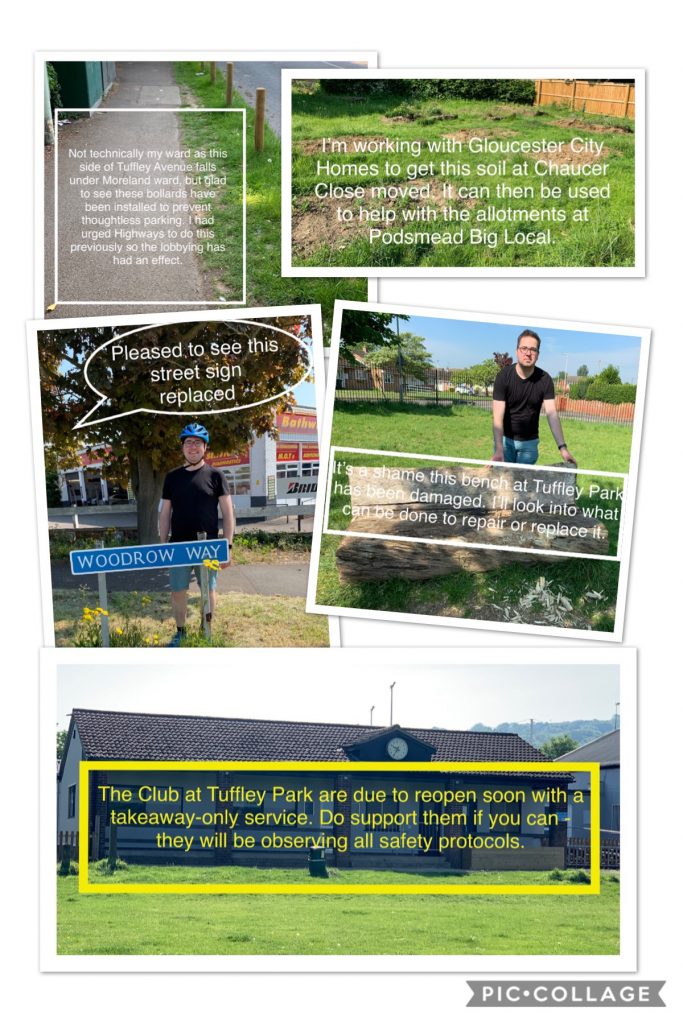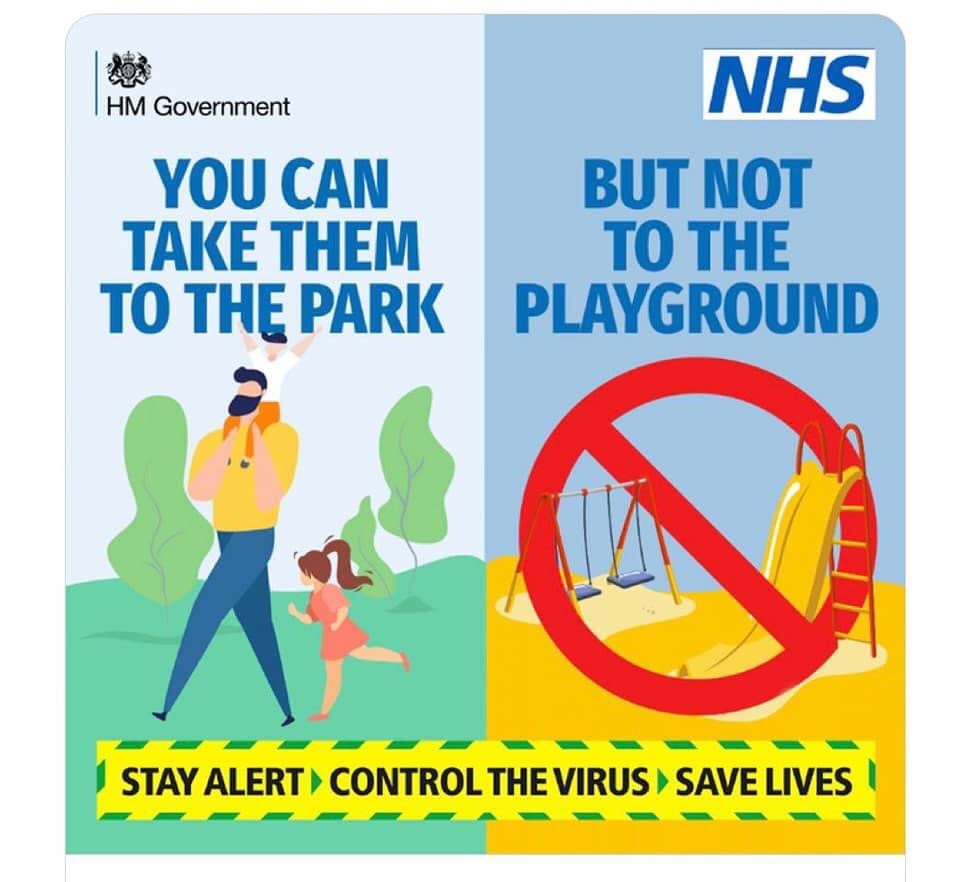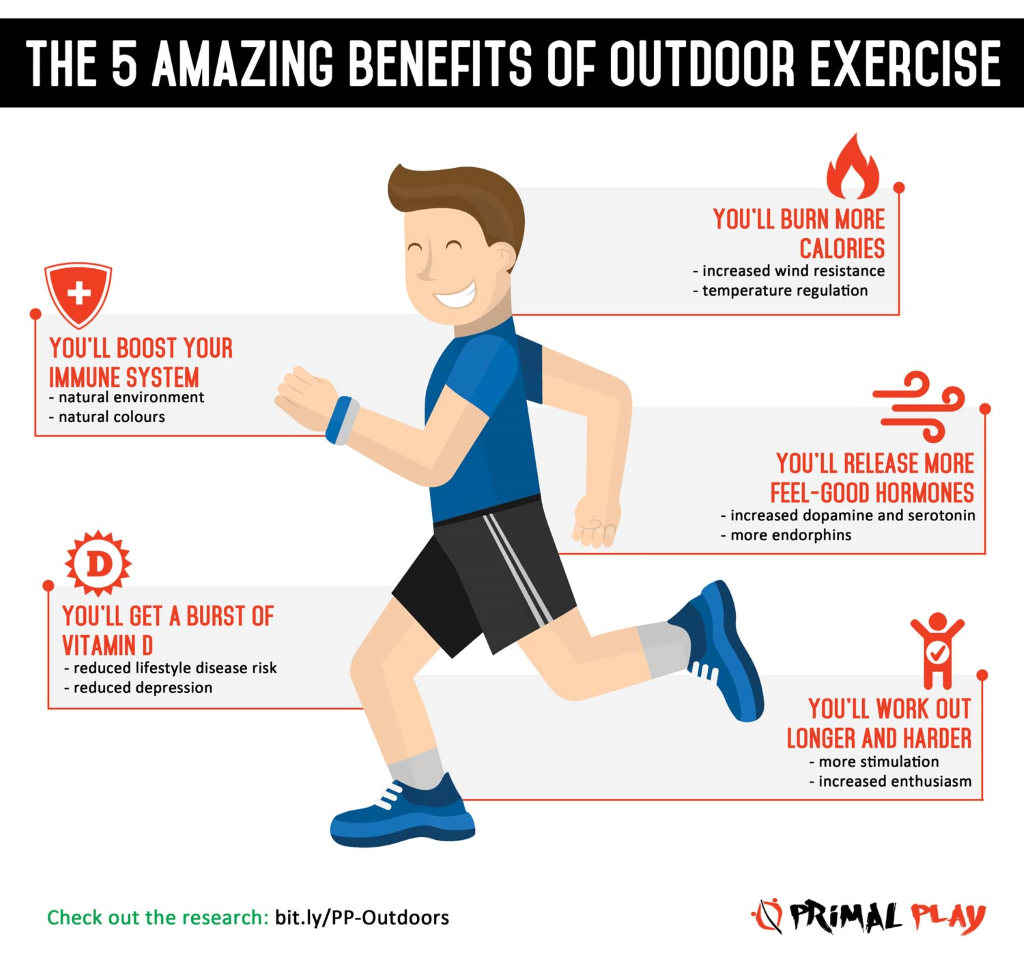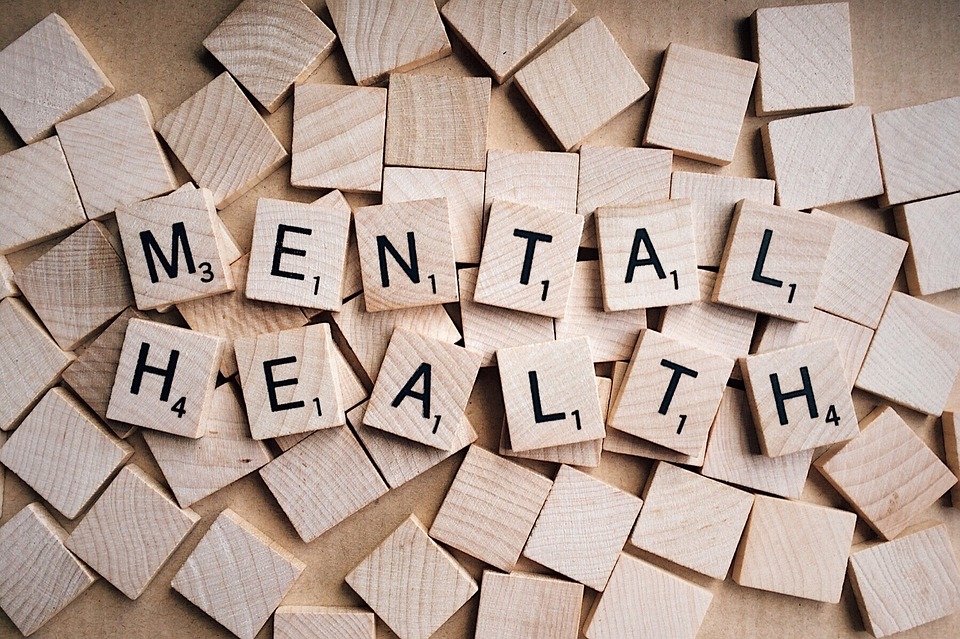
With leaflet delivery still not possible due to the pandemic, I have been producing these photo Spotlight newsletters instead.
They show a small selection of the work I am doing for Podsmead.

With leaflet delivery still not possible due to the pandemic, I have been producing these photo Spotlight newsletters instead.
They show a small selection of the work I am doing for Podsmead.

Recently I cycled to the three Podsmead play areas – Scott Avenue, Milton Avenue and Tuffley Park.
I had received reports that the play areas were still being used and wanted to check that there were signs up. I was able to confirm that there are signs up at all three areas.
I have, though, asked the council to put some more up as there are only a few in some areas, particularly the Milton Avenue area. I also asked why there weren’t signs up on the Scott Avenue basketball court and was told that following the latest government advice, basketball courts can be used by family groups plus one other person as long as they socially distance.
Official guidance remains that parks are open but the play equipment is not. Covid-19 can remain on surfaces, particularly metal, for several days, so it is a risk to use the play equipment.
As Gloucester City Council manages over 200 play areas it is virtually impossible to police them adequately.
We have to rely on the public using their common sense, and sharing the message that the parks can be used but not the play areas.
.

With guidance still encouraging people to stay at home, we all need to keep doing our bit.
There are lots of online resources to keep yourself occupied. Here are 10 links to free things:
1. Links to streams of classical music and opera can be found on the Guardian here.
2. Free ebooks and magazines from the library here.
3. Government education resources can be found here.
4. Audible are streaming a number of books for free. Details here.
5. See my article for a great guide on how to keep fit and healthy during the lockdown. Thanks to Gloucestershire Youth Support Team for sharing.
6. Free recipes on BBC Food.
7. Interesting essays and articles on tech and books on Kevin Kelly’s website.
8. The blog of author Tim Ferriss has some great links. He sends out a weekly email of things that have interested him.
9. Colouring heroes on Facebook have lots of free resources for children to colour in.
10. Lots of free quizzes for children can be found on the CBeebies website.
And finally – please send me your ideas of any other free resources!
with thanks to Gloucestershire Youth Support Team for this article
“Yet for all this, nature is never spent”……wrote the poet G.M. Hopkins.
With the current, necessary restrictions to fight COVID-19, keeping fit and physically, mentally, and spiritually healthy is more important than ever before.
Exercising in nature can confer many of these health benefits a few of which are conveyed in this
Gyms and fitness clubs are closed but our green spaces are still accessible so why not use your once daily permitted time away from home to exercise in the outdoors. Below are a few tips you might find useful.

Explore your local area
Grab a map, log into Google maps or download a smartphone app like ViewRanger, MemoryMap, RouteBuddy (only available with iPhones & iPads) or Ordnance Survey so you don’t get lost.
Download trails or make your own route up.
Find where those hidden lanes go, make and follow a route outline that looks like a dragon, or plan a fitness journey on quiet roads where you can practice hill reps, speed intervals or fartlek (look it up, not as silly as it sounds!) if you’re feeling fit without dodging people.
Dress for the weather
“There’s no such thing as bad weather; only bad clothes” as an old Scandinavian proverb puts it. Think in layers – what you wear next to your skin is most important.
Cotton will quickly get wet and chill you (Mountain Rescue refer to it as “Death Cloth” for this reason!), whilst synthetic and wool layers will help to wick moisture (sweat!) and keep you feeling dry.
Depending on the weather and how hard you’re exercising, put a warm layer and something light and windproof on top. Start off feeling cool – you’ll soon warm up – but think about if you have to stop for a long period.
Be visible to drivers
You don’t have to wear fluorescent kit with more lights than a Christmas tree, but light colours definitely make you more visible. large trucks or 4x4s may have difficulty seeing you – thinking of yourself as the invisible person trying to be seen may help . Pedestrians are most often hit when cars turn corners or a traffic light changes, so be especially careful at these places.
Connect
Hitting the beats through headphones can help motivate some people to exercise but means that you won’t be able to hear traffic or other dangers, turn them down.
Or off and…
Connect with your environment
Is that bird you hear – a Chiff-chaff or a Stonechat? (Clue – a chiff-chaff is a spring visitor and it’s call sounds like its name – chiff-chaff, chiff-chaff, until it trips over its own call; a stonechat sounds like two rocks being banged together…).
Listen to the wind whistling through your bike helmet or the sound of your tyres/feet on the gravel.
How many breaths does it take to walk 100m?
How many shades of green can you see?
What does the mud or dried leaves feel like as you pass through them?
Pick it up
“Progressive overload” is the technical term for training sessions progressively increasing on challenge as you adapt to training.
To get better and fitter, you need to challenge yourself – can you walk or run up that hill with less rests, or more weight, in a faster time than last week? Can you hold that stretch with better form and for longer?
It’s not just cardio work you can focus on outdoors – try adding resistance to strengthen muscles.You don’t have to run holding hefty rocks like a Royal Marines Commando Mountain Leader – try loading a rucksack and alternating running & walking with squats, lunges and jumps. You could use park benches or sturdy trees to replicate the exercises done in the gym.
Checkout “you are your own gym” or download the app for inspiration.
There’s lots of apps and smartwatches out there that will let you know how hard you’re working, how much recovery you need, what cadence you’re cycling at and even analyse your foot strike for more efficient running.
Without access to tech, if you’re exercising somewhere between “I can just about hold a brief conversation” to “I can just about utter a few words” you’ll get the most benefit out of your session.
Rest
Having one or two rest days – or at least lighter days is vital. It helps your recovery, prevents injury, helps prevent muscle fatigue and supports deep, healthy sleep.
If you exercise hard every day, not only will you not recover effectively, but you may find your motivation dips and your immune system isn’t as effective.
Rest is when your body adapts to exercise and repairs itself. Don’t feel guilty about taking a day off.
Have fun
Exercise doesn’t have to be a chore – find something that motivates and interests you.
A good long hike? Yoga on the grass? Bouldering? Mountain Biking? Animal Flow in the park? Dancing like you don’t care in the garden? The Body Coach’s PE class, live from 9am on Youtube every weekday morning
Boost your immune system and get a hit of feel-good endorphins in these troubled times – but please be responsible and follow current social distancing guidance #FlattenTheCurve.
Health experts are encouraging people across Gloucestershire to look after their mental health and wellbeing during the current Covid-19 ‘lockdown’.

The physical health impacts of Covid-19 are well recognised, but anxiety about health, job security and finances, social isolation and changes in routines and family relationships can have an impact.
Tips on maintaining health and wellbeing during the Covid-19 pandemic include:
There are agencies and websites available to help:
Additional resources are also available at https://www.gloucestershire.gov.uk/covid-19-information-and-advice/advice-on-covid-19/looking-after-your-wellbeing/
Anyone struggling with their mental health or finding it difficult to cope with everyday life can also contact their GP surgery.
With thanks to Gloucester City Council and Gloucestershire Community Help Hub for forwarding this information.
After an appearance of what looked like pollution at the pond recently, I asked the council to investigate. The results of this indicate no domestic waste contamination.
The slime on the pond is most probably a result of organic matter released when the pond was recently scraped.
I will keep in touch with the council, the Environment Agency and Severn Trent over this issue.

The WEA are offering a range of courses online free during the current crisis.
You can find out about them here.

We’ve got a huge range of children’s books which are available to any child that needs something to read and keep them entertained during Covid-19.
We can make up packs by age, reading ability and interest, and deliver them to any address in Gloucester, free of charge.
We also have illustrated story books for pre schoolers and some craft packs.
If you know of any child who would like to receive a book pack and craft materials please send details of their carer/ parent and address with a contact number and we’ll deliver as soon as possible. Clearly we will follow all GDPR guidelines. Email: Linda.cohen@lilypadpr.co.uk


Professional counsellor and hypnotherapist Teresa Dellbridge is offering support in these difficult times.
Counselling and hypnotherapy are available on FaceTime and other media.
Appointments are available at unsociable hours for those involved in sustaining us all, in whatever way, and payment can be by BACS donation, or provided free of charge for those experiencing economic hardship.
Please note all hypnotherapy involves you receiving a personal recording of your session, to play repeatedly.
Just call/text 07833752173, email teresadellbridge@gmail.com or log on to teresadellbridgewellbeing.co.uk
During the pandemic, Gloucester City Council are working very hard to continue services.
Inevitably, some services may be reduced due to staff shortages through illness or self-isolating, or due to budgetary pressures.
At the moment the city council are prioritising collection of recycling and residual waste (the black bins), and due to the high volume of residual waste being presented for collection, garden waste is being deprioritised. There are no guarantees of green waste collections at this time, so the advice is to compost where possible. Compost bins can be purchased from some shops which remain open.
You can find the latest information from Gloucester City Council here.